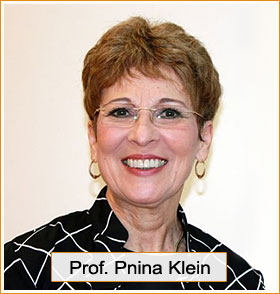
A breakthrough educational program called MISC (More Intelligent and Sensitive Child) has improved the learning capabilities and self-image of millions of children with developmental disabilities, including those with autism and Down’s syndrome in the United States. The program’s creator is Israel Prize-winning Prof. Pnina Klein, Director of Bar-Ilan University’s Baker Center for the Study of Development Disorders in Infants and Young Children.
 This highly-regarded program enhances caregiver interactions with children around the world – what Prof. Klein calls “the ABCs of love.” It has been adopted by the National Institutes of Health (NIH) as the tool for early intervention in combination with medical treatment for children in Africa who are infected with HIV-AIDS. The NIH decision to use MISC has been borne out because it has proven to heal the minds of African children who are surviving HIV-AIDS in growing numbers due to improved medications. These children can now become thoughtful, well-adjusted, community members.
This highly-regarded program enhances caregiver interactions with children around the world – what Prof. Klein calls “the ABCs of love.” It has been adopted by the National Institutes of Health (NIH) as the tool for early intervention in combination with medical treatment for children in Africa who are infected with HIV-AIDS. The NIH decision to use MISC has been borne out because it has proven to heal the minds of African children who are surviving HIV-AIDS in growing numbers due to improved medications. These children can now become thoughtful, well-adjusted, community members.
The MISC Program, designed for children with developmental disabilities, children from low income families and gifted children, has shown to be effective in improving the cognitive, psychosocial and emotional development of disadvantaged children. MISC is individually tailored to each child, based on the analysis of parent-child interactions and using naturally occurring situations and objects in the home environment.
In Israel, MISC is taught to all involved in early child care, including parents and caregivers in various settings of group care. But it has become popular around the world too, since the Program requires no special equipment and can be adapted to any culture. Klein’s approach to early intervention has been applied successfully with young children in Ethiopia, Sri Lanka, Indonesia, Norway, Sweden, Israel and the United States.
Early in her career, Klein began developing her ideas for this program by participating in a study being conducted in Washington, DC by the United States National Institute of Mental Health to track babies at risk for developmental problems. One of the earliest proponents of the MISC program was the University of South Florida, which used it as part of a special program to improve the learning curve of minority children.
Prof. Klein’s belief in tikkun olam (improving the world) was inspired by her parents, who survived the Holocaust while their families perished. “I think my mental diet was composed of a lot of love and caring, which probably enhanced in me a need to express it and do something for others.”
To learn more about Prof. Klein’s world-renowned research to improve the lives of children with developmental disabilities, call Howard Charish at 212-906-3900.


